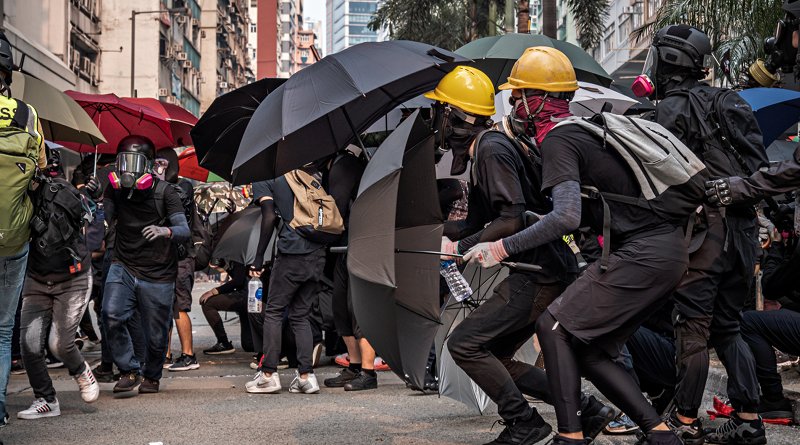US Support For Hong Kong Protests Squeezed By China – OpEd
By Arab News
By Ellen R. Wald*
When Hong Kong outlawed masks last week, some international commentators spoke on television as if they actually thought this might stop the protests that have taken over the city for almost half a year. Yet the new law — created by what is, in essence, an authoritarian power — failed. The protests continued, and the protesters continued to wear masks. These brave young Hongkongers are willing to be arrested and it is becoming increasingly clear that many of them are willing to die. It is time the world realizes this.
What the leaders in Hong Kong and international commentators failed to understand is that the government in Hong Kong no longer has authority. The protesters and people have withdrawn their consent to be governed by the Hong Kong government. The protesters demand freedom over their own lives, and they are taking that freedom. Hopefully they will succeed.
The protesters wear masks to protect themselves from gas dispersed by the riot police. But they also wear masks to hide their identities from the thousands of cameras used by the Hong Kong and Chinese authorities to identify and track them. The masks themselves, like the protests, are a reaction to the brutality and heavy-handedness of the Hong Kong government and the Chinese communist regime.
Outside of Hong Kong and China, there is a different concern. The world is struggling with if and how it should express support for the protesters. In the US, this is becoming a particularly pertinent issue. There are four different groups considering their support for Hong Kong protesters and each has different motives and concerns. They are the presidential administration under Donald Trump, other elected government leaders, the American people, and big businesses.
Trump and his administration must be careful in their support, because their priority is rightly the interests of Americans. Some members of his administration have voiced tepid support for the protesters, while the White House has also increasingly called for action to assist the 1 million or more Uighurs currently imprisoned by the Chinese authorities. However, the president is also in the midst of contentious trade talks with China that are of utmost importance for the US economy. He does not want to risk ruining a potential deal right now.
Other parts of the American government are, however, free to criticize China’s stance on Hong Kong. Several senators, most notably Marco Rubio of Florida, have vocally supported the protesters and criticized China’s response. Such criticism is seen positively by many American constituents, who generally cherish their own freedom and believe people around the world should share the rights to free speech, freedom of religion and choosing their own government.
Typically, Americans, like all people, are focused on their own lives. Most likely, the vast majority of Americans are unfamiliar with what is happening on the streets of Hong Kong. But, among those who have been watching and reading about it, the feeling is overwhelmingly in support of the protesters. No matter the practical stances taken by American presidents, the people of the US tend to support those seeking their own freedom, whether in Hungary in 1956, Iran in 2009 or Hong Kong today. Americans are limited in what they can do to support Hongkongers from an ocean away but, when the videos of freedom fighters are shown on television each night, Americans watch the violence in horror and respect the brave young men and women.
Then there is big business in America. China, by virtue of its giant population, is the largest market in the world and the second-largest economy. American businesses are terrified of upsetting the authoritarians in Beijing. US movie studios have been altering their films to avoid Chinese censors. Next year, Paramount Pictures will release a long-awaited sequel to the 1986 film “Top Gun.” The hero, played by Tom Cruise, is a naval aviator who wears a flight jacket like he did more than 30 years ago. In 1986, when China’s economy was still struggling, the hero’s jacket had patches showing he had been deployed to Taiwan and Japan. Today, China’s film censors are too powerful, so those patches had to be removed to avoid angering them.
This past weekend, the National Basketball Association (NBA) found itself caught directly between the moral cause of supporting pro-democracy protesters in Hong Kong and the powerful centralized forces of the Chinese economy. Daryl Morey, a top executive for the Houston Rockets basketball franchise, tweeted his support for a free Hong Kong. This immediately angered Chinese authorities. For China, Houston is not just any franchise, it is where the country’s best ever basketball player, Yao Ming, spent his NBA career. Thus, it is a focus of China’s basketball fans. After threats to hinder the Rockets’ and NBA’s revenue in China, including threats from Yao himself, the Rockets’ biggest star James Harden, Morey, Rockets owner Tilman Fertitta and the NBA all capitulated.
America wants to support the protesters in Hong Kong. While there is an understanding that the president must be careful in his support, many Americans would probably prefer he be a little more vocal on the protesters’ behalf. However, Americans become very uncomfortable when they see film studios, professional sports leagues, the press, retailers and others capitulate to China’s speech control. Money may rule, but it is a truly sad day when China or any other authoritarian regime can squelch free speech in America with its economic weight.
- Ellen R. Wald, Ph.D. is a historian and author of “Saudi, Inc.” She is the president of Transversal Consulting and also teaches Middle East history and policy at Jacksonville University. Twitter: @EnergzdEconomy

